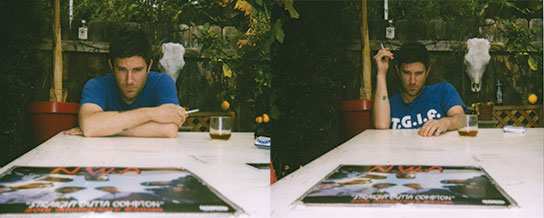Pedestrian Dissects N.W.A.
America, your Gs are middle-aged. And they’ve long since followed the vapor trail of white […]

Pedestrian Dissects N.W.A.
America, your Gs are middle-aged. And they’ve long since followed the vapor trail of white […]

America, your Gs are middle-aged. And they’ve long since followed the vapor trail of white flight far from the block. Strange, isn’t it, that in claiming Compton they were propelled from the flatlands to the hills, to tax brackets unheard of in South Central L.A.? And more, it was by reppin’ Compton so hard that they found their way through the sunny vocabulary of pop to the profane shadows of language as it’s actually spoken.
The soul of N.W.A. is the word “fuck,” and it’s more than apparent than ever on the 20th anniversary re-release of their seminal Straight Outta Compton. Rap was born anew in 1988, amid the ruins of The Fat Boys, and its first mutterings followed from terribly perfect phrases like “Word to the motherfucker,” “Fuck the po-lice,” and “Let me tell you mothafuckers who you fuckin’ with.” With Ice Cube’s “fuck,” the Hays Code, which lingered in the psyches of record labels 30-some years after it withered in Hollywood, was overruled. Sure, “fuck” was uttered by mumble-mouthed Schooly D., image-conscious Ice-T, and single-minded 2 Live Crew, but it was N.W.A. that cleared the fields on which a half million Parental Advisory stickers flowered, and N.W.A. who introduced into vestigially Victorian suburbs the play of the foul.
A violent boy band, N.W.A. had the matching costumes of an R&B quartet, but theirs were from an L.A. swap meet–this was convict chic, anti-flash flash with an occasional staginess that somehow underscored their authenticity; there’s something that seems real about tackiness. How else to explain the terrorizing effect of Cube’s famously furrowed brow, framed as it was by glittering, girlish Jheri curls?
What was striking about N.W.A. in ’88 was that they parlayed their denim ordinariness into spotlit spectacle. They rapped in the boastful key of young men everywhere. They lit up kitchen-sink realism with the blunt glamour of adolescent male fantasy, and it is an injustice, of course, to hold a young man to his word. Perhaps the unsentimental innocence–yes, innocence–of N.W.A. was some large measure of their charm.
Gangsta rap has matured since ’88–see Scarface or U.G.K.–but it could not have done so without its childhood in Compton, a photo album which rests on the coffee table of this album. Nietzsche wrote, “A man’s maturity consists in having found again the seriousness one had as a child at play.” Why not freeze the moment in stone? I see four monumental statues in a loose quartet: Dre standing off to one side in calculating approval, Cube’s incisors clenching his bottom lip, Ren letting a short breath escape, and Eazy screwing up his face for a cold plosive “ck.” And at last, the mouthing of “fuck” is given its duly heroic scale.
Brandon Best records as Pedestrian for anticon.

